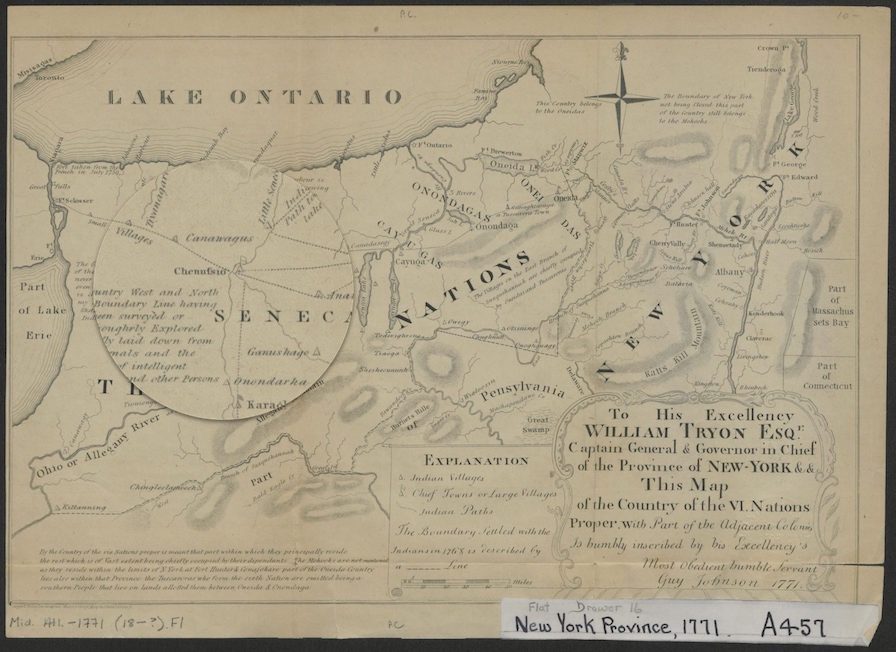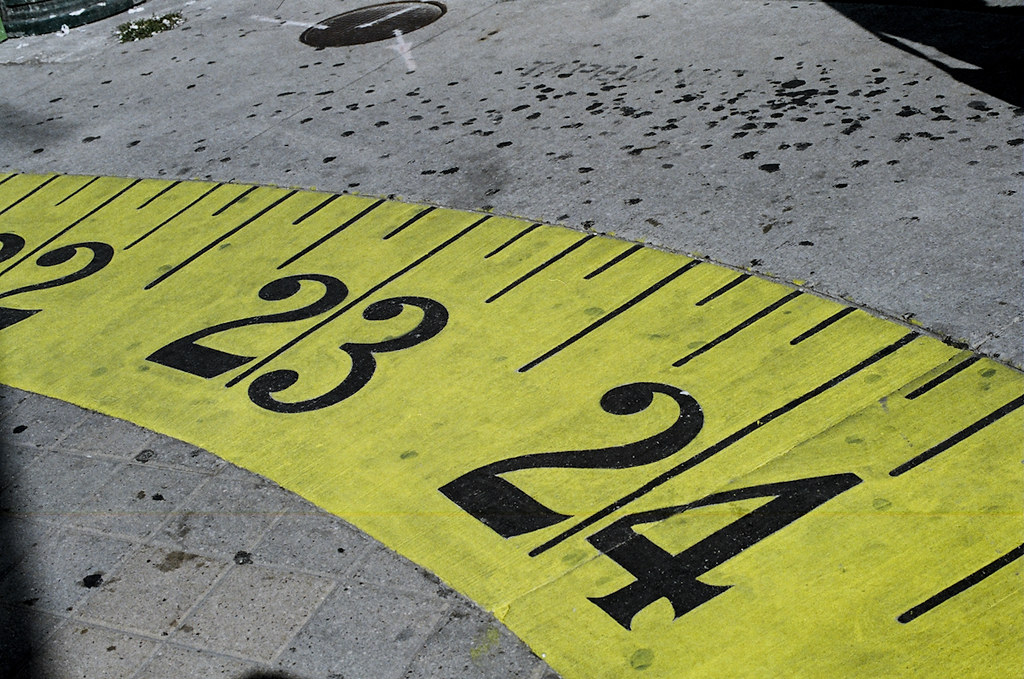31 Mar 2021
by Michael Oberg, Contributor
Labels: Perspectives
online learning
antiracism
intersession 2021
 1771 map of “The Country of the VI. Nations” inscribed to William Tryon, extracted from E. B. O’Callaghan, The Documentary History of the State of New York (1851). Via the Brooklyn Historical Society. Modified to highlight the location of Chenussio. Public domain.
1771 map of “The Country of the VI. Nations” inscribed to William Tryon, extracted from E. B. O’Callaghan, The Documentary History of the State of New York (1851). Via the Brooklyn Historical Society. Modified to highlight the location of Chenussio. Public domain.
Editor’s note: This post is one in a series by Geneseo faculty who in Intersession 2021 taught courses that either focused centrally on issues of racial justice or incorporated those issues via dedicated modules and interwoven content. To find all posts in this series, part of Geneseo’s project of becoming an antiracist college, look for the tag “intersession 2021”.
What does it mean to teach Native American history on a campus committed to antiracism when that commitment does not extend to Indigenous Peoples? Sure, at Geneseo we do a territorial acknowledgment at the beginning of formal campus events, and the Haudenosaunee flag hangs in a gallery of national flags in MacVittie College Union and on stage at commencement. My Intersession 2021 class was included in a menu of “Antiracism” courses at Geneseo. But we will not fly the flag on the official campus flag pole like many of our sister institutions, and we have yet to make a determined investment in recruiting Native American students. We have no Native American faculty.
Read more …
26 Mar 2021
by James Moor, Contributor
Labels: Perspectives
online learning
antiracism
intersession 2021
 A mob of white men posing in front of the office of the black-owned Daily Record newspaper after burning it down, Wilmington, North Carolina, November 10, 1898.
A mob of white men posing in front of the office of the black-owned Daily Record newspaper after burning it down, Wilmington, North Carolina, November 10, 1898.
Editor’s note: This post is one in a series by Geneseo faculty who in Intersession 2021 taught courses that either focused centrally on issues of racial justice or incorporated those issues via dedicated modules and interwoven content. To find all posts in this series, part of Geneseo’s project of becoming an antiracist college, look for the tag “intersession 2021”.
I have taught Politics of the Judicial Process five times while at Geneseo. To keep my interest, and hopefully student interest, I change the emphasis fairly often. When Michelle Alexander’s The New Jim Crow came out, I used it. In the same class I employed Brandon Garrett’s Too Big To Jail. The juxtaposition of Black incarceration and all its negative effects on one hand, and white corporate America paying a fine out of corporate coffers on the other, made for an interesting learning experience for students.
Read more …
22 Mar 2021
by Jessica Gilbert, Contributor
Labels: Perspectives
online learning
antiracism
intersession 2021
 Satellite photo of Theewaterskloof Dam, South Africa, during the Cape Town water crisis of 2017-18. Processed via Sentinel Hub.
Satellite photo of Theewaterskloof Dam, South Africa, during the Cape Town water crisis of 2017-18. Processed via Sentinel Hub.
Editor’s note: This post is one in a series by Geneseo faculty who in Intersession 2021 taught courses that either focused centrally on issues of racial justice or incorporated those issues via dedicated modules and interwoven content. To find all posts in this series, part of Geneseo’s project of becoming an antiracist college, look for the tag “intersession 2021”.
As a social scientist teaching Environmental Issues (ENVR 124), I have a lot of fun disrupting students’ perspectives of what constitutes “the environment.” Students typically come into my class expecting to spend the bulk of their time exploring ecological concepts and problems, but they quickly learn that much of the course focuses on digging into the relationships between humans and our surroundings. By positioning Environmental Issues as an explicitly antiracist course for the 2021 intersession, I took these connections further to examine the impacts of power relations and economic structures. I encouraged my students to consider “environmental issues” as components of broader socio-ecological systems and to conceptualize the implications of such problems for questions of sustainability and justice.
Read more …
20 Mar 2021
by Justin Behrend, Contributor
Labels: Perspectives
online learning
antiracism
intersession 2021
 Jackie Robinson, Brooklyn Dodgers, 1954. Photo by Bob Sandberg, Look photographer. Restoration by Adam Cuerden. Public domain, via Wikimedia Commons
Jackie Robinson, Brooklyn Dodgers, 1954. Photo by Bob Sandberg, Look photographer. Restoration by Adam Cuerden. Public domain, via Wikimedia Commons
Editor’s note: During the January 2021 Intersession, as part of Geneseo’s project of becoming an antiracist college, nearly a dozen faculty taught courses that either focused centrally on issues of racial justice or incorporated those issues via dedicated modules and interwoven content. Professor Behrend’s post is one in a series in which faculty reflect on their objectives and experience in these courses. You can read previous posts in this series by Professor Melanie Medeiros and Professor Meredith Harrigan.
For as long as I can remember, I have been a baseball fan. And not just a baseball fan, but a Dodger fan. Watching Dodger games on television and attending games at Dodger Stadium was a memorable part of my upbringing in Los Angeles.
I don’t remember when I first learned about Jackie Robinson. He is, of course, known for breaking the color line in baseball: the first Black ballplayer in the major leagues in the twentieth century. But he’s also a Dodger legend. So I’ve long taken pride that my team — the Dodgers — was the team that began to break down segregation in baseball.
Read more …
17 Mar 2021
by Meredith Harrigan, Contributor
Labels: Perspectives
online learning
antiracism
intersession 2021
 “Measurement,” by Flickr user Batara (Adityo Sastromuljono), CC BY-NC-ND 2.0
“Measurement,” by Flickr user Batara (Adityo Sastromuljono), CC BY-NC-ND 2.0
Editor’s note: During the January 2021 Intersession, as part of Geneseo’s project of becoming an antiracist college, nearly a dozen faculty taught courses that either focused centrally on issues of racial justice or incorporated those issues via dedicated modules and interwoven content. Professor Harrigan’s post is one in a series in which faculty reflect on their objectives and experience in these courses. Previously, Professor Melanie Medeiros described her experience teaching Race, Racism and the Black Experience in the Americas.
I am a relational communication teacher-scholar and a growth seeker. At the heart of my teaching is a value for dialogue, which is a unique communication process that prioritizes multivocality, listening, reflection, and connection.
When I was presented with the opportunity to support the college’s value of inclusion through integrating antiracist content into my January 2021 intersession online course, I quickly jumped at the chance knowing that the process would foster my personal and professional growth. With feelings of excitement and apprehension, I began the work.
Read more …
 1771 map of “The Country of the VI. Nations” inscribed to William Tryon, extracted from E. B. O’Callaghan, The Documentary History of the State of New York (1851). Via the Brooklyn Historical Society. Modified to highlight the location of Chenussio. Public domain.
1771 map of “The Country of the VI. Nations” inscribed to William Tryon, extracted from E. B. O’Callaghan, The Documentary History of the State of New York (1851). Via the Brooklyn Historical Society. Modified to highlight the location of Chenussio. Public domain.
 A mob of white men posing in front of the office of the black-owned Daily Record newspaper after burning it down, Wilmington, North Carolina, November 10, 1898.
A mob of white men posing in front of the office of the black-owned Daily Record newspaper after burning it down, Wilmington, North Carolina, November 10, 1898. Satellite photo of Theewaterskloof Dam, South Africa, during the Cape Town water crisis of 2017-18. Processed via
Satellite photo of Theewaterskloof Dam, South Africa, during the Cape Town water crisis of 2017-18. Processed via  Jackie Robinson, Brooklyn Dodgers, 1954. Photo by Bob Sandberg, Look photographer. Restoration by Adam Cuerden. Public domain, via
Jackie Robinson, Brooklyn Dodgers, 1954. Photo by Bob Sandberg, Look photographer. Restoration by Adam Cuerden. Public domain, via  “Measurement,” by Flickr user
“Measurement,” by Flickr user